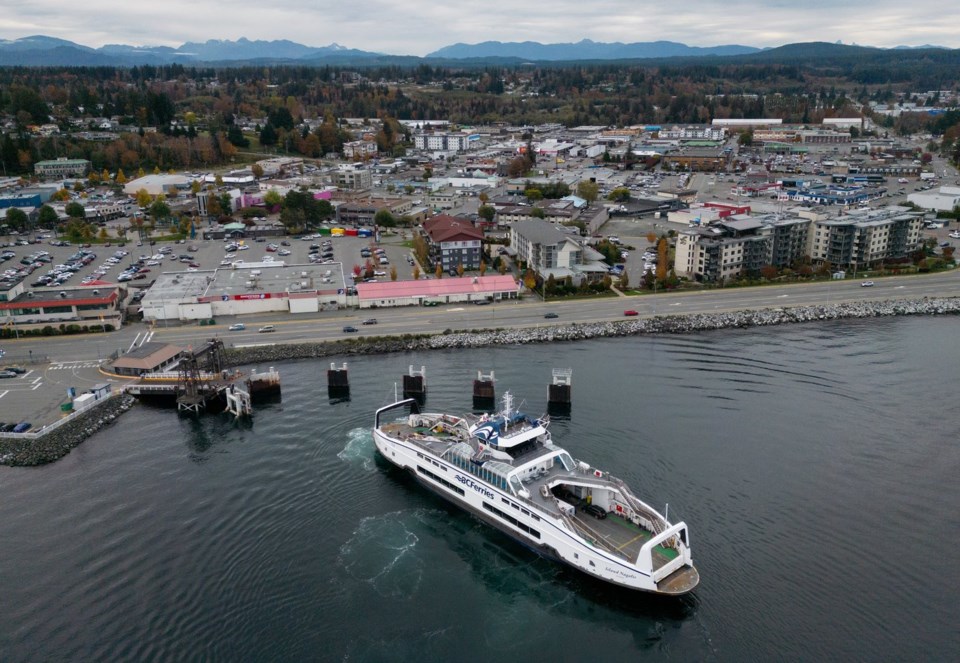VICTORIA — A federal Crown corporation is loaning BC Ferries $1 billion to help buy four Chinese-made ships, a purchase that federal Transport Minister Chrystia Freeland recently said was dismaying and should involve no federal funds.
Freeland had written to the province on June 16, asking B.C. to confirm "with utmost certainty" that no federal funds would be "diverted" to the purchase from China Merchants Industry Weihai Shipyards.
Canada Infrastructure Bank confirmed the loan on Thursday, saying the new electric ferries "wouldn't likely be purchased" without the financing.
Jeff Groot, executive director of communications for BC Ferries, said the company signed the loan with the bank before it was finalized that the Chinese shipyard would win the contract, and before Freeland's letter to her provincial counterpart, Mike Farnworth.
He also said there were no Canadian bidders for the contract.
BC Ferries CEO Nicolas Jimenez said in an interview Thursday that he "was surprised and disappointed" by Freeland's letter.
"I think it was the general tone and direction of the letter," he said. "What we would look to the federal government is to be a partner in the delivery of ferry renewal in British Columbia. I didn't feel that or see that in the letter, and I would hope to be looking to work with the federal government and the provincial government."
He said he would "have expected more engagement and dialogue" from Ottawa to build vessels for a provincial ferry system that had "really outgrown itself."
Freeland's letter expressed "great consternation and disappointment" with the ferry operator over the purchase.
The bank said the low-cost loan consists of up to $690 million to buy the vessels and up to $310 million for electrification infrastructure.
Jimenez said the full loan would save BC Ferries about $650 million in interest.
He said "commercial realities" for both BC Ferries and the shipyard prevent him from talking about the full size of the agreement, but added that the loan would cover a "substantial" part of the deal.
"It is, in our view, a game-changing financial arrangement that has allowed us to make this significant investment in fleet renewal," he says.
He added that it would also improve affordability.
BC Ferries said the vessel portion of the bank's loan would represent a maximum of 42.5 per cent of the total purchase price. That would suggest that if the maximum $690 million were spent on the new ferries, their minimum cost would be about $1.6 billion.
But Groot said that was "not representative" of the cost, and there was "flexibility to repurpose" unspent amounts on the vessel side of the loan to cover infrastructure costs.
Jimenez also said it was impossible to "reverse engineer" the cost of the ships from the loan amounts.
BC Ferries also plans to issue bonds later this year to help pay for the ferries, but Jimenez declined to give details about how much of the purchase these would cover.
Groot had said in a previous statement that the contracted Chinese shipyard had "the strongest bid by a significant margin."
Jimenez said BC Ferries was held to what he called a "double-standard" when it came to purchasing ferries abroad. He said that in the last 10 years, Canadian companies had hired Chinese shipyards to build about 100 ships.
Marine Atlantic, a federal Crown corporation, was one of the companies. Through an arrangement with Stena RoRo, it hired the same shipyard building the new vessels for BC Ferries to build one ship.
"But somehow, when it comes to building a vessel, and particularly a ferry, there is an expectation that that is really the responsibility of BC Ferries to do this single-handedly, when, in fact, it's much more complicated than that," he said.
"An industrial strategy requires much more than just putting an order into a local shipyard."
B.C.'s Ministry of Transportation said in a statement Thursday that the province had no role in the funding arrangement between BC Ferries and the Canada Infrastructure Bank.
"As such, it's for the federal government and the BC Ferries to comment," it said.
The Canada Infrastructure Bank is accountable to Parliament through the federal Minister of Housing, Infrastructure and Communities, former Vancouver mayor Gregor Robertson.
Mohammad Hussain, a spokesperson for Robertson's office, said Robertson has asked for a briefing from the bank's CEO "on the kind of considerations this decision raises."
Hussain called BC Ferries' procurement decision "extremely disappointing."
"The Canada Infrastructure Bank supports key infrastructure projects that are needed in our communities," he said. "While our government had no influence or participation in this procurement decision, we will still emphasize once again the importance of supporting domestic industry."
B.C. Conservative Harman Bhangu, transportation critic for his party, said in a statement that Freeland needs to "immediately" reconsider the terms of the loan to protect Canadian jobs, businesses and security interests.
This report by The Canadian Press was first published June 26, 2025.
Wolfgang Depner, The Canadian Press



